
Caetano Emanuel Viana Telles Veloso is a Brazilian composer, singer, guitarist, writer, and political activist. Veloso first became known for his participation in the Brazilian musical movement Tropicalismo, which encompassed theatre, poetry and music in the 1960s, at the beginning of the Brazilian military dictatorship. He has remained a constant creative influence and best-selling performing artist and composer ever since. Veloso has won nine Latin Grammy Awards and two Grammy Awards. On November 14, 2012, Veloso was honored as the Latin Recording Academy Person of the Year.
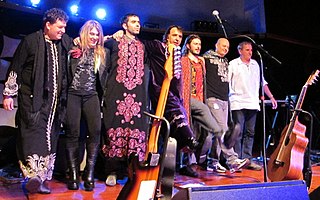
Os Mutantes are an influential Brazilian psychedelic rock band that were linked with the Tropicália movement of the late 1960s.
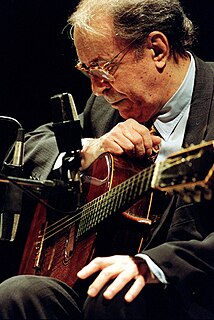
João Gilberto Prado Pereira de Oliveira, known as João Gilberto, is a Brazilian singer, songwriter, and guitarist. He created the musical genre of bossa nova in the late 1950s.
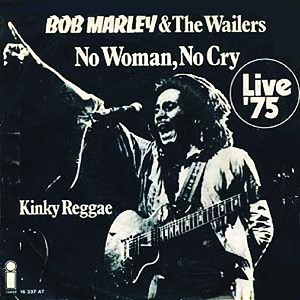
"No Woman, No Cry" is a reggae song by Bob Marley and the Wailers. The song first became known in 1974 from the studio album Natty Dread. This studio version used a drum machine. The live version from the 1975 album Live! was released as a single and is the best known version; it was included on the greatest hits compilation Legend, and was recorded at the Lyceum Theatre in London on July 17, 1975 as part of his Natty Dread Tour.
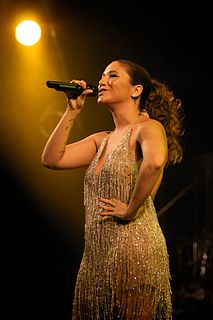
Maria Rita is a Brazilian singer. Born Maria Rita Camargo Mariano, she is the daughter of famed pianist/arranger César Camargo Mariano and the late Brazilian singing legend Elis Regina and sister to Pedro Mariano and music producer João Marcelo Bôscoli. Her namesake is family friend and famed Brazilian rock legend Rita Lee. She studied at New York University, and worked as a journalist at a magazine for adolescents.

Rita Lee is a Brazilian rock singer and composer. She is a former member of the Brazilian band Os Mutantes and is a popular figure in Brazilian entertainment, where she is also known for being an animal rights activist and a vegetarian. She has sold more than 60 million albums worldwide.

Gal Costa is a Brazilian singer of popular music.

João Voz e Violão is a bossa nova album by João Gilberto, released in 2000. Recording very little in the 1990s, this album is Gilberto's first studio album since 1991's João. The album won the 2001 Grammy Award for Best World Music Album.

Tanto Tempo is an album by Brazilian bossa nova singer Bebel Gilberto. The album was included in the book 1001 Albums You Must Hear Before You Die.

Pedro Anibal de Oliveira Gomes, better known as Pepeu Gomes is an accomplished Brazilian guitar player, multi-instrumentalist and composer. He was one of the members of Novos Baianos.
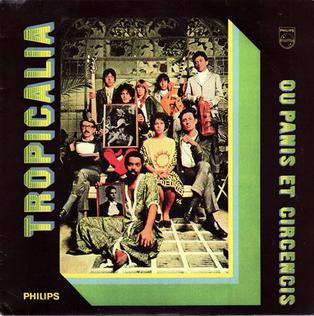
Tropicália ou Panis et Circencis is a 1968 collaboration album by artists including Gilberto Gil, Caetano Veloso, Tom Zé, Os Mutantes and Gal Costa. Considered an important record in the history of Brazilian music, it features arrangements by Rogerio Duprat and lyrical contributions from Torquato Neto.

João Donato de Oliveira Neto is a Brazilian jazz and bossa nova pianist from Brazil. He first worked with Altamiro Carrilho and went on to perform with Antonio Carlos Jobim and Astrud Gilberto.

Doces Bárbaros is a 1976 album by the Música popular brasileira supergroup of the same name. It was recorded June 24 of that year at Anhembi Stadium in São Paulo. Its members were Gilberto Gil, Caetano Veloso, Maria Bethânia and Gal Costa, four of the biggest names in the history of the music of Brazil. The band was the subject of a 1977 documentary directed by Jom Tob Azulay. In 1994, they performed a tribute concert to Mangueira school of samba.
Extra is an album by Brazilian singer and composer Gilberto Gil, released in 1983.

Gil e Jorge is a 1975 album featuring collaboration between Brazilian musicians Jorge Ben and Gilberto Gil. The two perform together alongside percussionist Djalma Corrêa on each of the songs, improvising and interacting directly throughout.

Gilberto Gil is the second studio album by Gilberto Gil, originally released in early 1968. The album features a blending of traditional Brazilian styles such as samba and bossa nova with American rock and roll. It also mixes Rogério Duprat's orchestral arrangements with the electric guitars of Brazilian rock group Os Mutantes.

Gilberto Gil is the third solo album by Gilberto Gil, originally released in 1969. The album was arranged by Rogério Duprat, and has a strong element of psychedelic rock to it, being considered by some to be his most experimental album. Since Gil was not allowed by the Brazilian military dictatorship to leave Salvador, Bahia, before being exiled to London, he recorded vocals and acoustic guitar in Salvador, and Rogério Duprat recorded the other instruments in Rio de Janeiro and São Paulo.

Expresso 2222 is the fifth studio album by Brazilian artist Gilberto Gil, released in June 1972 by Philips Records. In October 2007, the magazine Rolling Stone's Brazilian edition published a list of the 100 Greatest Albums of Brazilian Music, in which Expresso 2222 featured at number 26.

Quanta gente veio ver: Ao Vivo, known internationally as Quanta Live, is a Grammy-winning 1998 album by Brazilian musician Gilberto Gil recorded live with a seven-piece band at the Teatro João Caetano in Rio de Janeiro during his 1997 world tour. At the 41st Annual Grammy Awards, it won the award for Best World Album. The album's tracks span a number of musical styles, including tropicalia, a genre with which Gil is closely associated, as well as samba, funk, bossa nova, reggae, jazz, salsa, and pop.



















